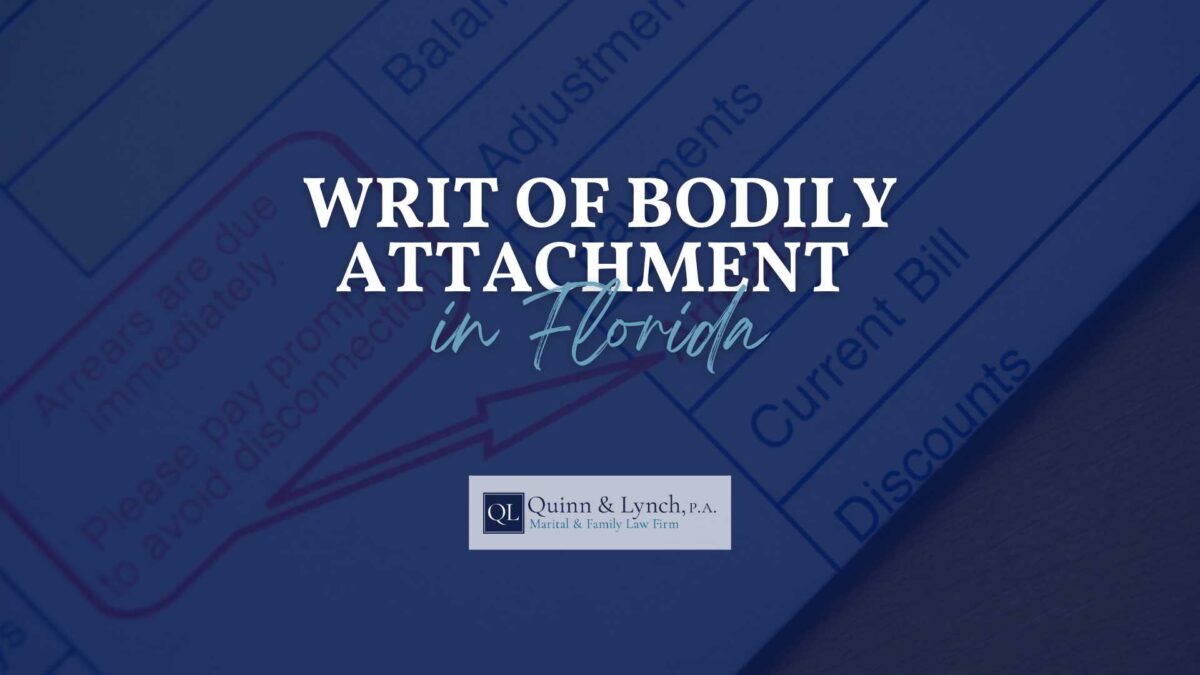A writ of bodily attachment in Florida is a court order issued to compel compliance with legal obligations, often related to civil contempt or injunction when other methods, such as wage garnishment or imputed income for child support payments in Florida have been rendered ineffective. This legal tool, also called a writ of body attachment, is commonly used to secure alimony or child support in Florida. If a party is found in contempt of court, the writ allows the sheriff or other law enforcement agencies to perform a civil arrest, ensuring the person in contempt appears before the court.
What Is a Writ of Bodily Attachment in Florida?
Under Florida law, a court may issue a ne-exeat or injunction called a writ of bodily attachment, commonly termed “body attachment,” when a party is planning to remove his or her property out of state or fraudulently convey or conceal it. Such orders help secure alimony or child support on behalf of the party that should receive such payment.
This can be issued as a court order by a circuit court judge, district court judge, magistrate judge, or bankruptcy judge under the seal of the court clerk.
When a Florida court issues a writ of body attachment in connection with a failure to pay child support, the writ must include such information:
- the respondent’s physical description
- the respondent’s location
Essentially, when a court issues a writ of body attachment for someone who has failed to pay support in Florida, the writ must include enough details about the respondent’s physical description and location to enter it into Florida’s crime database. It also allows for collecting the actual costs related to the service and transporting the person in compliance thereof.
The writ of body attachment can be served and enforced at any time.
Florida Writ of Body Attachment Process
When the court issues a writ of bodily attachment in Florida, here’s how the process works:
A writ of body attachment in Florida is typically handled by the county sheriff. However, in certain federal cases, such as those involving a district court judge, magistrate judge, or bankruptcy judge, the court clerk issues the writ of body attachment, and the U.S. Marshals Service serves it.
- In-State Cases: For writs issued within Florida, the appropriate clerk of court sends a copy of the writ for service to the sheriff in the county where the original writ was issued. The sheriff receiving the notification is responsible for enforcing it locally. During service, the sheriff will find the person, put them under civil arrest, and take them into custody so they can be brought to court (forcibly if necessary).
- Out-of-State Cases: For writs involving individuals outside Florida, the court clerk may send the writ to the U.S. Marshals Service for enforcement. During service, the U.S. Marshal Service will find the person, put them under civil arrest, and take them into custody so they can be brought to court (forcibly if necessary).
- In-Court Cases: A person is given a writ of body attachment during a court hearing in cases where they’re found in civil contempt and remanded. When this occurs, the sheriff or U.S. Marshals Service doesn’t need to find the subject. The person will need to submit proof of service. This is simply proof that the person in civil contempt has been remanded.
For in-state cases, upon receipt of the writ of body attachment from the clerk, the sheriff will enter the details of the unserved writ into Florida’s crime database so other law enforcement agencies across the state can access it. The writ can be enforced anywhere in Florida.
If the person makes such payment to resolve the writ of bodily attachment, the receiving agency will give the “subject” a written receipt acknowledging the purge payment. The person must keep the written receipt acknowledging the payment on hand for at least 30 days from the date of the purge payment as proof of such payment.
The sheriff receiving such payment will send the payment to the sheriff who entered the writ into the system, who then forwards the support to the appropriate clerk of court.
If the court changes, purges, cancels, resolves, or otherwise deems the writ of body attachment rendered ineffective, the court clerk must inform the sheriff receiving the original writ. The sheriff then updates or removes the writ from the crime database to reflect such notification.

Florida Writ of Bodily Attachment for Child Support
A writ of bodily attachment for child support in Florida is an injunction used when the person ordered to pay child support is delinquent in their court-ordered support obligation, has received fair warning about delinquency, or their failure to pay child support, whether this is by choice or financial hardships, and fails to remain in compliance thereof.
According to Florida Statute, the circuit court of any county may find the person in civil contempt for a failure to pay child support. It’s important to note that civil contempt is different from criminal contempt. However, penalties for civil contempt are still serious.
In Florida, the writ of body attachment for child support orders any sheriff receiving the notification of injunction to arrest the person in civil contempt for failure to pay child support.
The Florida Department of Revenue (DOR) or the party to whom such payment is owed will first file a Motion of Contempt. This states that the subject has failed to pay child support and child support arrears in Florida, putting them in defiance of the court ordered support obligation.
How Far Behind in Child Support Before Civil Arrest in Florida
If a parent fails to pay child support and is behind on the court-ordered support obligation for 15 days, their driver’s license may be suspended.
How far behind in child support before a warrant is issued in Florida, though?
If the child support delinquency reaches $2,500 and is four months past due, the parent may face felony charges for failure to pay child support. If a parent is found in contempt of court for willfully not paying child support, the court may issue a Writ of Bodily Attachment. This legal action will lead to civil arrest until the child support payment is made as ordered.
How Long Does a Writ of Bodily Attachment Last in Florida?
A Writ of Bodily Attachment in Florida remains active until it is resolved, either by compliance or through a legal process. There is no automatic expiration date.
What to Do If You Receive a Writ of Body Attachment in Florida
If you receive a Writ of Bodily Attachment in Florida, it is crucial to act quickly to address the issue and avoid detention for nonpayment of child support or missing a hearing. Our Tampa child support attorneys can help you understand your legal options. You may need to make the purge payment or comply with the court order in order to have the writ of bodily attachment dismised.
How a Tampa Child Support Lawyer Can Help
A Tampa child support enforcement attorney helps clients with unpaid child support or other support issues, providing experienced legal knowledge to ensure such orders are handled professionally. Attorneys can also work to address unserved writ matters by coordinating with law enforcement agencies to ensure compliance.
Whether you need to modify an existing order, secure alimony or child support, or enforce overdue child support payments, our experienced Tampa family law firm offers direct support and legal solutions.
















